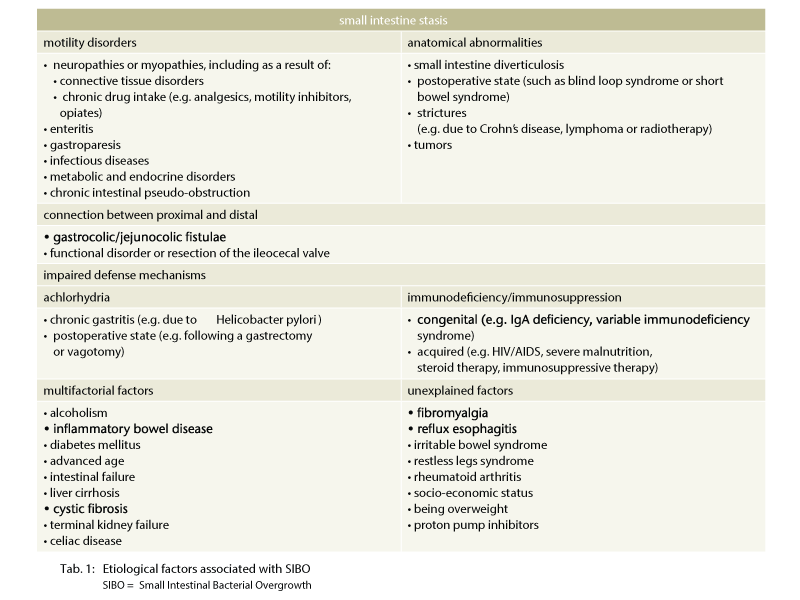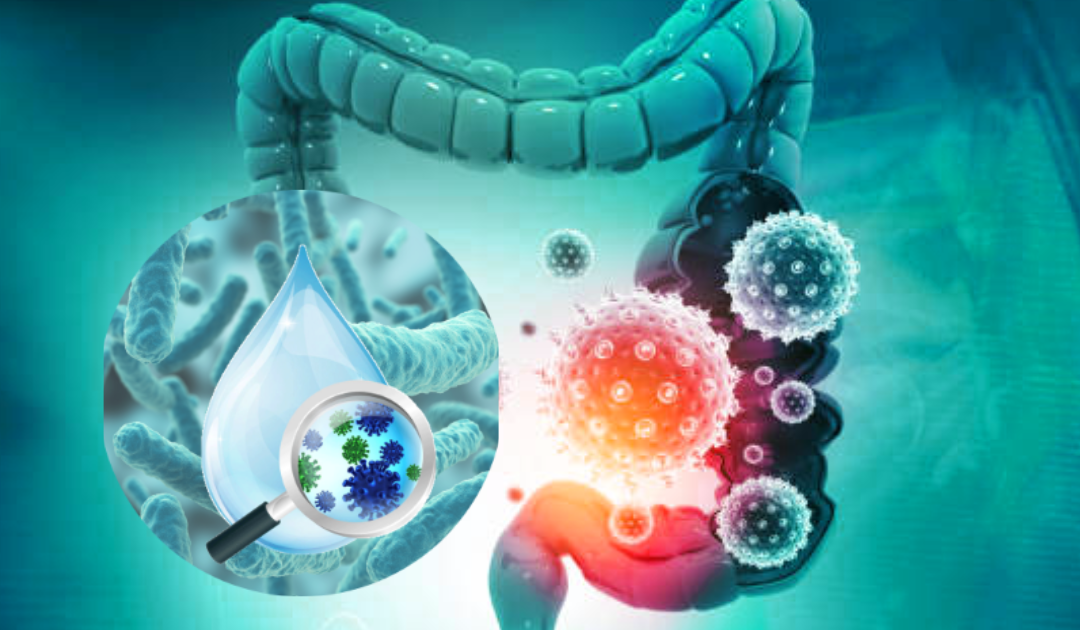
Bacterial overgrowth of the small intestine (SIBO) is one of the most common causes of intestinal problems. Patients are often diagnosed with IBS, or IBD, because they cannot pinpoint the cause of their symptoms. A well-chosen stool test or an H2 breath test could reveal underlying SIBO.
Recurrent bloating and fatigue are common symptoms that people endure untreated for years, neglecting the cause of their symptoms. They go to a dermatologist with their skin problems, and in the case of bloating, they do an allergy test, although in most cases, SIBO is the root cause of all this.
SIBO facts symptoms scauses
If you bloat after eating, don’t think primarily about gluten sensitivity, as most people do. Unfortunately, one of the primary symptoms of SIBO is bloating. SIBO (small intestine bacterial overgrowth) syndrome occurs when, for some reason, the number of bacteria in the small intestine in the small intestine increases (and becomes contaminated, that is, the small intestine becomes dirty).
However, the right place for intestinal bacteria is in the colon. Here they help break down food, synthesize vitamins, and empty excess. Bacteria that enter the small intestine feed on undigested food, especially sugar, simple and complex carbohydrates, starch, and alcohol.
The fermentation of carbohydrates produces hydrogen, which is an excellent food for microorganisms in the small intestine, which will then produce methane as a by-product. So in the case of SIBO, there is too much hydrogen or methane in the digestive system, which causes bloating.
5 facts about SIBO
- SIBO is generally associated with an underlying condition, so it is not an infection. It is a consequence.
- SIBO can be cured, but it can relapse, and relapses can be prevented.
- It is not recommended to take probiotics during having SIBO. Only soil-based or yeast-based strains can be used that cannot overgrow in the small bowel.
- Diet will not cure SIBO permanently, it can only relieve the symptoms.
- In case of severe SIBO you need to take rifaximin, herbal antibiotics won’t solve the problem, they can only help in preventing relapses.
More info about these is here: 5 Facts about SIBO

Symptoms
- Bloating and diarrhea, abdominal pain or cramps
- Constipation (much less common than diarrhea)
- Diagnosis of Irritable Bowel Syndrome (IBS) and Inflammatory Bowel Disease (IBD)
- Food intolerance, such as gluten, casein, lactose, fructose, and especially histamine intolerance
- Chronic diseases such as fibromyalgia, chronic fatigue syndrome, diabetes, neuromuscular disorders and autoimmune diseases
- Vitamin and mineral deficiencies, mainly A, B12, D and E
Fat absorption disorder (indicated by pale, voluminous and foul-smelling faeces) - Perioral Dermatitis, Acne, Rosacea and other skin rashes
- Leaky gut syndrome
SIBO facts symptoms causes
Etiological factors associated with SIBO (1)

Causes in details
Low stomach acid
In the case of low stomach acid (HCL-hypochlorite), the food is not broken down perfectly, the big undigested carbohydrates get into the small intestine. Bacteria feed on these carbohydrates, allowing them to multiply. Gastric acid is the first barrier that suppresses the growth of bacteria; at low levels, the bacteria can multiply freely.
As a by-product of carbohydrate digestion, bacteria produce hydrogen gas, increasing the pressure in the abdominal cavity by pushing acid from the stomach into the esophagus, leading to “acid reflux” (1). Doctors usually prescribe an acid-blocking drug; however, since the initial problem was an acid deficiency, these drugs further exacerbate symptoms and may increase the likelihood of developing SIBO
Low stomach acid → heartburn → antacids → H. pylori infection → further reduction of stomach acid → chronic heartburn and GERD (2)
Reduced bile secretion and enzyme production (3)
Proteolytic enzymes and bile acids are necessary for proper digestion of food and also have an antibacterial effect. In the absence of an enzyme, it again almost decomposes properly into carbohydrates which provides fuel for bacterial overgrowth. Without necessary enzymes and bile acids, the risk of developing SIBO increases.
Antibiotics
Prolonged antibiotic treatments for other diseases can upset the microbiome balance and even cause dysbiosis, increasing the chances of developing SIBO.
Stress
In a stressful situation, our body produces less stomach acid, which reduces bile secretion and enzyme production, and stress can weaken the immune system and slow down bowel movements, making food a pang, a condition that allows bad bacteria to overgrow or an infection that may require antibiotics. further increasing the risk of developing SIBO.
Migrant motor complex dysfunction (4)
If our digestive system is healthy, the migrating motor complex (MMC), i.e., is a recurring motility pattern that occurs in the stomach and small bowel during fasting; it is interrupted by feeding. If it is not working properly, SIBO increases. MMC function problems can occur in some health issues, such as:
hypothyroidism
proton pump inhibitors
inflammatory bowel diseases such as Crohn’s and colitis
Diabetes
Celiac disease
gastroenteritis, C difficile, and other infections
Lyme disease
Ehler Danlos Syndrome
history of eating disorders
Dysfunction of intestinal nerves (5)
The peristalsis of the GI tract is essential to move food from the mouth to the anus to prevent food from stagnating in the small intestine. Several conditions can influence this movement, such as gastroparesis, scleroderma, even Parkinson’s disease, and other neurogenic problems (Gut Motility).
Structural changes in the digestive system can also inhibit the movement of food and bacteria from the small intestine to the colon, such as adhesions, blockages, diverticula in the small intestine, and stenoses. These can increase the risk of developing SIBO.
Unbalanced Microbiome
The basis of the intestinal microbiome is built up during childbirth and breastfeeding. Children born through C-section and those who are not breastfed are at increased risk of developing microbial imbalances (dysbiosis), and SIBO.
Food poisoning
Due to acute gastroenteritis (food poisoning), diversity of the gut microbiome can be changed drastically. A single occurrence of gastroenteritis may increase the chances of developing SIBO by a factor of six. (6)
Five facts about SIBO
Treatment of SIBO
Foods in SIBO
Diagnosis of SIBO
SIBO aggravating factors
Resources
[1]
Wijendran V, Huang MC, Diau GY, et al. Efficacy of dietary arachidonic acid provided as triglyceride or phospholipid as substrates for brain arachidonic acid accretion in baboon neonates. Pediatr Res 2002;51:265-272.
[2]
Goustard-Langelier B, Guesnet P, Durand G,et al. n-3 and n-6 fatty acid enrichment by dietary $sh oil and phospholipid sources in brain cortical areas and nonneural tissues of formula-fed piglets. Lipids 1999;34:5-16.
[3]
Maki KC, Reeves MS, Farmer M, et al. Krill oil supplementation increases plasma concentrations of eicosapentaenoic and docosahexaenoic acids in overweight and obese men and women. Nutr Res 2009;29:609-615.
[4]
Bunea R, El Farrah K, Deutsch L. Evaluation of the effects of Neptune Krill Oil on the clinical course of hyperlipidemia. Altern Med Rev 2004:9:420-428.
[5]
Sampalis F, Bunea R, Pelland MF, et al. Evaluation of the effects of Neptune Krill Oil on the management of premenstrual syndrome and dysmenorrhea. Altern Med Rev 2003;8:171-179.
[6]
Deutsch L. Evaluation of the effect of Neptune Krill Oil on chronic inflammation and arthritic symptoms. J Am Coll Nutr 2007:26:39-48.
[7]
Chang JP, Chen YT, Su KP. Omega-3 polyunsaturated fatty acids (n-3 PUFAs) in cardiovascular diseases (CVDs) and depression: Cardiovasc Psychiatry Neurol 2009;2009:725310. Epub 2009 Sep 27.
[8]
Breslow J. n-3 fatty acids and cardiovascular disease. Am J Clin Nutr 2006;83:1477S-1482S.
[9]
Calzolari I, Fumagalli S, Marchionni N, DiBari M. Polyunsaturated fatty acids and cardiovascular disease. Curr Pharm Des 2009;15:4094-4102.
[10]
No authors listed. Phosphatidylcholine. Altern Med Rev 2002;7:150-154.
[11]
Naguib YM. Antioxidant activities of astaxanthin and related carotenoids. J Agric Food Chem 2000;48:1150-1154.
[12]
Tso P, Drake DS, Black DD, Sabesin SM. Evidence for separate pathways of chylomicron and very low-density lipoprotein assembly and transport by rat small intestine. Am J Physiol 1984;247:G599-G610.
[13]
Amate L, Gil A, Ramirez M. Feeding infant piglets formula with long-chain polyunsaturated fatty acids as triacylglycerols or phospholipids influences the distribution of these fatty acids in plasma lipoprotein fractions. J Nutr 2001;131:1250-1255.
[14]
Tandy S, Chung RW, Wat E, et al. Dietary krill oil supplementation reduces hepatic osteatosis, glycemia, and hypercholesterolemia in high-fat-fed mice. J Agric Food Chem 2009;57:9339-9345.
[15]
Alberts B, Johnson A, Lewis J, et al. Molecular Biology of the Cell. 4th ed. New York, NY: Garland Science; 2002.
[16]
Else PL, Hulbert AJ. Membranes as metabolic pacemakers. Clin Exp Pharmacol Physiol 2003;30:559-564
[17]
Kidd PM. Omega-3 DHA and EPA for cognition, behavior, and mood: clinical findings and structural-functional synergies with cell membrane phospholipids. Altern Med Rev. 2007 Sep;12(3):207-27.
[18]
Konagai C, Yanagimoto K, Hayamizu K, Han L, Tsuji T, Koga Y. Effects of krill oil containing n-3 polyunsaturated fatty acids in phospholipid form on human brain function: a randomized controlled trial in healthy elderly volunteers. Clin Interv Aging. 2013;8:1247-57.
[19]
Ebrahimi M, Ghayour-Mobarhan M, Rezaiean S, et al. Omega-3 fatty acid supplements improve the cardiovascular risk profile of subjects with metabolic syndrome, including markers of inflammation and auto-immunity. Acta Cardiol. 2009 Jun;64(3):321-7.
[20]
Derosa G, Cicero AF, Fogari E, et al. Effects of n-3 PUFAs on postprandial variation of metalloproteinases, and inflammatory and insulin resistance parameters in dyslipidemic patients: evaluation with euglycemic clamp and oral fat load. J Clin Lipidol. 2012 Nov-Dec;6(6):553-64.
[21]
Spencer M, Finlin BS, Unal R, et al. Omega-3 fatty acids reduce adipose tissue macrophages in human subjects with insulin resistance. Diabetes. 2013 May;62(5):1709-17.
[22]
Yan Y, Jiang W, Spinetti T, et al. Omega-3 fatty acids prevent inflammation and metabolic disorder through inhibition of NLRP3 inflammasome activation. Immunity. 2013 Jun 27;38(6):1154-63.
[23]
Valensa. FlexPro MD Clinical Trial Overview and Results. (Data on File.) 2011
[24]
McCann JC, Ames BN. Is docosahexaenoic acid, an n-3 long-chain polyunsaturated fatty acid, required for development of normal brain function? An overview of evidence from cognitive and behavioral tests in humans and animals. Am J Clin Nutr 2005;82:281-295.
[25]
Stevens LJ, Zentall SS, Abate ML, et al. Omega-3 fatty acids in boys with behavior, learning, and health problems. Physiol Behav 1996;59:915-920.


